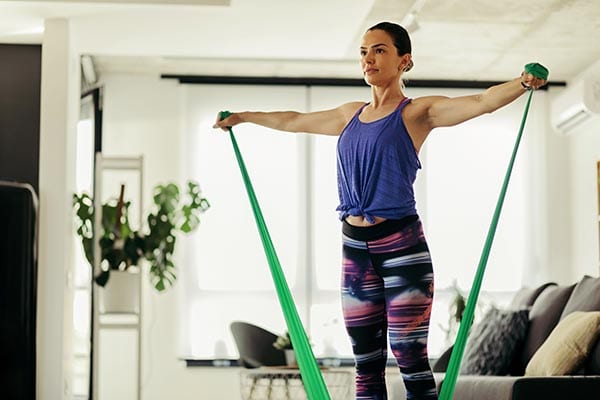How to fine-tune your fitness routine

What are your fitness goals for the new year? If you’re feeling slightly daunted about achieving a new you, then the smart upgrades recommended by leading fitness experts will set you off in the right direction. What matters, they say, is that mind and body are primed for the challenge and that your fitness goals are as inspiring as they are rewarding. ‘Planning is required,’ says Dr Josephine Perry, a sport psychologist at Performance in Mind and author of Performing Under Pressure (Routledge, £17.99), ‘but you can achieve great things this year.’ Armed with our tips and advice, there’s nothing to hold you back.
Try something new every month
‘You’ll burn off body fat stores much more effectively with a varied exercise programme,’ says Julia Buckley, a UK-based fitness trainer who produces fat-burning workout videos, and posts on Instagram with the handle @juliabfit. ‘Mixing up our workouts and trying something new each month will help you torch calories, build lean muscle (which means we burn more fat even while we rest) and get fit.’ She recommends a combination of strength, cardio, HIIT, and power-yoga-style workouts.
Create your own mantra
Researchers have found using positive ‘head chatter’ to remind ourselves of our goals can be transformative if you hit a fitness barrier or plateau. ‘Often it can feel like our inner voice is trying to trip us up or make us feel like a failure, but instead think of it as a coach, personal trainer or friend,’ suggests Dr Perry. ‘Imagine how encouraging and enthusiastic those people would be, and channel that vibe to create a phrase that you can repeat to yourself so you stay focused on your goal. A mantra I use at the moment is “Do less, better”,’ says Dr Perry.
Aim for a new running PB
‘When you first start running, your time will improve quite quickly,’ says Laura Fountain, a running coach and author of the Lazy Girl Running blog. ‘Eventually, though, your times will plateau.’ That doesn’t mean you can’t improve, but it will involve some planning and structured training, so depending on the distance you are tackling, set aside 8-16 weeks to train for your goal. ‘Your training needs to be structured so that you spend time building up your distance, working on your goal pace and adding speed before tapering for your PB attempt,’ says Fountain.
Factor in recovery time
One of the big mistakes people make in terms of fitness is neglecting recovery and the upshot is you quickly get too mentally and physically exhausted to work out. Dalton Wong, founder of Twenty Two Training and fitness advisor to celebrities including Olivia Colman and Jennifer Lawrence, says 2020 should be the year you change this habit. ‘Rest is equally important as hard work,’ Wong says. ‘It’s vital you take care of your body physically and mentally. I suggest to my clients that they invest in themselves weekly in any form of recovery – it could be physical aspects like a sauna, cryotherapy, massage or beauty treatment; or mentally by meditating or enjoying time with friends. The better rested your body, the more resilient you are.’
Set a challenges
Monotony and boredom are the big enemies of fitness and setting yourself a new challenge is the best way to offset them. Attack that long-held desire to run a 5K or a marathon, attempt a triathlon or to walk the Pennine Way. Your challenge can be anything that is motivational to you and that will get you inspired and off the sofa in January. ‘Choose a goal that is the right balance – difficult enough to be challenging, yet not so hard that you set yourself up to fail,’ says Dr Perry. ‘Be realistic about your aim – it needs to be enough of a stretch that you will have to get up and train for it, but also be really specific and have a deadline so that you don’t linger on it for too long.’
Start lifting weights
Many women are afraid of lifting weights, fearing it will leave them bulky. But Dalton Wong says most women will benefit from some weight training. ‘Resistance and weight training will boost your metabolism by up to 30 per cent because having more lean tissue means you are continually burning extra calories, even when you’ve finished,’ Wong says. Plenty of studies have proven that lifting weights is the route to shedding fat. In one trial, it was shown that combining weight training with a low-calorie diet preserved much-needed lean muscle mass much more effectively than aerobic workouts. Start with a weight that feels comfortable or join a weight-training class.
Cultivate your gut garden
The bugs in our gut have been linked to lower levels of inflammation, boosted metabolism and, most recently, improved fitness performance. ‘Scientists have shown that exercise independent of diet increases the diversity of the gut microbes that are a marker of good gut health,’ says Dr Megan Rossi, a nutrition research associate at King’s College London and author of Eat Yourself Healthy (Penguin, £16.99). ‘But a healthy diet will also boost gut health, reducing the chance of illness that could impact your fitness improvements.’ Rossi suggests eating a diverse range of gut-friendly foods. ‘Each week, try to consume 30 different plant-based foods – foods from a variety of food groups such as wholegrains, vegetables, fruits, nuts, seeds and legumes – and dabble in fermented foods like kefir and kimchi.’









